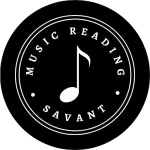Looking for the best beginner music theory book for self-study? Help is here.
Music theory can be a tricky subject to learn, especially for right-brain creatives. It activates the left side of the brain more where analytical people thrive. You see, music isn’t “theory” at all.
- Looking for the best beginner music theory book for self-study? Help is here.
- Can You Self Study Music Theory?
- Best Music Theory Book for Self-Study
- Learn Basic Music Theory
- Music Theory Course-In-A-Book
- Who This Book on Music Theory is For
- Can I Learn Music Theory Without Instruments?
- Can I Learn Music Theory Without Piano?
- Can I Self Study AP Music Theory?
- Best Music Theory Book for Self-Study Summary
The foundational elements involve mathematical concepts such as the Pythagorean theory and science such as sound waves and vibrational frequencies. According to Wikipedia, music patterns and its mathematical relationships have been studied for centuries. This all involves numbers that left-brainers love.
The right-brainers, not so much. Creative people are afraid it will hinder their creativity. Nothing could be further from the truth. A deeper understanding of music theory builds a strong foundation that elevates creativity. It will help you fly more freely rather than hold you back.
Not taking the time to learn the fundamentals of music theory can hold you back. We need to understand the language of music in order to speak it, sing it, play it, write it, and create it. In simple terms, knowledge of music theory and how to apply it helps you soar.
You want to free yourself to fly and become your best creative self, but is it possible to learn music theory on your own?
The answer is yes and here’s why.

Can You Self Study Music Theory?
Absolutely, you can self study music theory and learn most concepts on your own. I highly recommend doing this first before paying for a class or private lessons. You’ll get much more from your studies with a teacher by introducing yourself to the basics of music theory first.
Music theory books are great resources if you’re studying music independently. There are tons of options out there, but only one that’s definitely worth checking out. If you’re looking for a good book to start with, check out my recommendation below.
Best Music Theory Book for Self-Study
The best music theory book for self-study is Alfred’s Essentials of Music Theory: A Complete Self-Study Course for all Musicians by Andrew Surmani, Karen Farnum Surmani, and Morty Manus. I highly recommend this book for anyone who wants a good foundation in music theory in their spare time. It’s set up like a workbook with answers included in the back of the book.
Learn Basic Music Theory
This book and accompanying ear training CDs are ideal for musicians who want to study music theory without spending hours practicing an instrument every day. You’ll learn the basics of music theory in 75 concise lessons, plus you’ll get to practice your music reading and composing skills in the exercises.
3 Music Theory Books in One
There are 3 books included in this one comprehensive music theory workbook, making it a great value. There are 6 units and 25 short lessons in each book. Also included is a glossary with an index of music terms and symbols.
The beginning of each book has a table of contents to help you navigate through the material. For example, a lesson on tetrachords and major scales is found in lesson 26 on page 43. This lesson is located in unit 7 of book 2. This is the middle section of the book. The answers to this lesson can be found on page 132 in the back of the book.
After completing all exercises in unit 7 (lessons 26-30), you are ready to practice ear training on page 48 with the answers found on page 48. Next, is a complete review of unit 7 lessons on page 49 with the answers found on page 133. The ear training and review found at the end of each unit is a great way to see how much you remember and what you may want to go over again before moving on.
Develop Ear Training
You’ll also improve your listening skills with 2 ear training CDs that teach you how to identify notes, chords, scales, and intervals. It also helps you hear what is being taught in each unit after completing each short lesson.
A variety of instruments are used in each audio example. This opens your ears to a variety of sounds instead of only hearing a piano. Instruments used in listening excerpts include flute, clarinet, alto saxophone, trumpet, trombone, violin, cello, and piano.
The track numbers are listed beside each practice exercise, making it easier to find and play on the CD. There are exercises to complete while listening to the tracks. The answers to each ear training section are included in the back of the book for self-checking.
Comprehensive Review
You’ll test your knowledge with a comprehensive review that covers all 18 units. A review of lessons is included at the end of each unit. The answers to each review section are included in the back of the book. You can check your answers to see how much you remember.
Music Theory Course-In-A-Book
This course-in-a-book is great for any skill level, including those who need a refresher. It’s designed as a systematic comprehensive approach to music fundamentals every musician needs, even the most advanced players. Ear training CDs are also included to help you develop a musical ear.
As a practical guide for pianists, instrumentalists, guitarists, singers, songwriters, composers, and arrangers, it’s ideal for complete beginners. There are 75 one-page lessons to help you read music, write music, and develop deeper listening skills. After working through the exercises, you can test yourself in the review section.
Who This Book on Music Theory is For
What I love most about this book is that it works for a variety of situations. I have used this to teach students privately and in large classroom settings. It’s ideal for adults who want an easy-to-use independent study that fits into busy schedules.
Students in 4th grade and higher can go through this workbook as well. Homeschool parents will absolutely love this resource to help complete their child’s music education. It serves as an excellent introduction to music theory appropriate for ages 9 and above.
High school students will find it extremely helpful to complete this self-study course before taking AP Music Theory or becoming a music major in college. I wish it was available before I took Music Theory I. Learning the concepts of music theory first before taking music theory classes in college would have made everything go much smoother. Having no background before diving into college level music classes is pretty stressful.
Further Reading: What is AP Music Theory?
This is still the best self-study course I found on the market today that will give you a complete understanding while learning how to play an instrument, write songs, or take lessons. It’s essential for all music students to complete this book first before taking college level music theory classes. Believe me, the music theory textbooks are not easy to understand at first.
If you are ready to expand your musical knowledge, here’s where you can find this Alfred Music Theory book.
Improve your understanding of music theory and gain confidence in your ability to compose and perform music!
Of course, you don’t have to know how to play any instrument before getting started. Some concepts will be explained using a picture of piano keys. This is only because it is easier to understand visually.
Can I Learn Music Theory Without Instruments?
It’s possible to learn music theory without instruments. You don’t need to know how to play an instrument first before getting started. An understanding of basic music theory will help you learn how to play an instrument faster and easier.
These musical concepts help you learn how to read music, write music, and perform music better. If you’re serious about a career in music, getting into the music business, or you want to become more in demand as a musician, then gaining music theory knowledge is important. Music enthusiasts will absolutely love it too.
Can I Learn Music Theory Without Piano?
You absolutely can learn music theory without the piano. Knowing how to play the piano is helpful, but it’s not important before getting started. All aspects of music theory can be learned by everyone, even if you’re not a piano player.
Having a basic understanding of the piano keys is definitely helpful, but you will learn this in a good music theory book. Keyboard visuals are used frequently to show patterns and relationships in music because it is much easier to understand. The ability to see it speeds up your understanding.
Can I Self Study AP Music Theory?
commend going through the self-study music theory book mentioned above first before venturing into advanced concepts.
Once you have a basic understanding of musical notation, deeper aural skills with the audio lessons, basic music terms, and an introductory application of the elements of music, you are ready to move on.
The next book you need is Barron’s AP Music Theory book. This test prep book begins where the other book leaves off. It moves from basic to advanced study quickly. The music files for the online audio portion of the guide can be accessed here.
This is an excellent music book for those preparing for the AP Music Theory Exam. It includes in-depth chapters reviewing course content, practice exercises with answers, downloadable audio files for ear training practice, and two practice tests.
Spend a full year going through this book. The AP Music Theory exam is not something you can cram. Have patience with yourself and allow enough time to process each concept. Complete all exercises and take the practice tests multiple times. Create flash cards for yourself to review regularly. The more repetition you have, the more you remember.
Best Music Theory Book for Self-Study Summary
Finding the best music theory book for self-study is no easy task. It needs concise lessons that start from the very beginning and moves progressively building upon each lesson. Since it is for independent study, it’s best as a workbook and not a textbook.
Having answers in the back of the book is crucial for self-checking with review sections to see what you’re understanding and remembering. This Alfred music theory book hits the mark. It is useful for ages 9+ with busy high school students, college students, and adults especially getting value from this easy-to-use resource in their spare time.
High school students wanting to take an AP Music Theory course and music majors will find this workbook essential as a beginning point. All other music classes will be much easier once a basic understanding is established. Songwriters, composers, arrangers, and instrumentalists will also find the materials highly useful in furthering their musical development.
Overall, this book is the best I have ever seen on the market specifically for studying music theory on your own. I even recommend starting here before hiring a teacher, investing in lessons, or taking a class. It’s an affordable option that is available to everyone.
Do you study music theory on your own? What materials have you found useful? Please share in the comments below.

Hi, You can go through with this Music Theory- From Beginner to Expert is a great introduction to music theory that covers pretty much everything that anyone who plays or wants to play music, and wishes to become a better musician, should know.